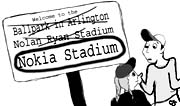|
Sports
have become too commercialized By
Hemi Ahluwalia Candlestick Park, Joe Robbie Stadium, The Spectrum Center and Reunion Arena are just a few of the stadiums across the nation which have recently received new high-tech names. The United
Center, The Staples Center, ProPlayer Stadium and Quacom Stadium
are now the new trend in corporate names which have started to buy
up the homes of America’s favorite pastimes. This trend in the renaming of old stadiums, or the construction of bigger, better stadiums started in the early 1990s. According to Phil Schaaf, author of “Sports Marketing: It’s Not Just a Game Anymore,” naming a ballpark after a corporation started as a wild card idea, but has become a trend because sports budgets are reaching unthinkable dollar amounts. With corporations willing to pay between $40 million to $100 million to lock in their names, sports teams can’t resist taking the offer. This problem doesn’t hit far from home. With the new building of the American Airlines Center to replace Reunion Arena, the Dallas/Fort Worth area will soon be taken over just like the cities of San Francisco and Los Angeles were. On Opening Day 2000, more than half of all baseball stadiums in America had been renamed after big businesses. The Ballpark in Arlington might be the next to be hit with a different name. Recent reports have the Nokia Corporation possibly buying a big chunk of the stadium. It seems like only yesterday when owners were trying to decide if they wanted the new stadium to have Nolan Ryan’s name on it. I guess times have changed. So what is the problem with the ballparks and sport stadiums being taken over by these companies? Well for one thing, when I go to a Texas Rangers baseball game, I go there to see Pudge and A-Rod, not an advertisement for Jose Cuervo and Kinko’s. And why do we have to tear down legendary baseball fields to build new ones? The coliseums in Europe have been up for centuries, and no one has torn them down to build a newer model with a corporate name attached to it. But in defense of the team owners, I realize the money has to come from somewhere to afford the big-name players. But does the whole stadium have to be filled with billboards instead of pictures of legendary players? You would think all of the promotional giveaways offered at the games and the increased ticket prices would be enough to pay for high-priced players. What is another reason a team might sell out to the big names? Well for one thing, a stadium with a big name has more leverage to bargain with the city and taxpayers for a new place to play. And what a better way to attract fans then to have a brand new stadium with high-tech equipment to entertain the patrons. Isn’t the job of the teams to entertain the fans? What happened to going to a ball game, sitting in the glow of a stadium that has history surrounding it, buying a hot dog and soda and sitting back to watch your favorite players hit a homer out of the ballpark? Hemi Ahluwalia is a junior broadcast journalism major from Stephenville. She can be reached at (h.ahluwalia@student.tcu.edu). Editorial policy: The content of the Opinion page does not necessarily represent the views of Texas Christian University. Unsigned editorials represent the view of the TCU Daily Skiff editorial board. Signed letters, columns and cartoons represent the opinion of the writers and do not necessarily reflect the opinion of the editorial board. Letters to the editor: The Skiff welcomes letters to the editor for publication. Letters must be typed, double-spaced, signed and limited to 250 words. To submit a letter, bring it to the Skiff, Moudy 291S; mail it to TCU Box 298050; e-mail it to skiffletters@tcu.edu or fax it to 257-7133. Letters must include the author’s classification, major and phone number. The Skiff reserves the right to edit or reject letters for style, taste and size restrictions. |
The TCU Daily Skiff
© 1998, 1999, 2000, 2001
Web Editor: Ben Smithson
Contact Us!

